Parting is such sweet sorrow, but a successful exit is just plain sweet! As we say goodbye to Eaton Towers as an independent entity, we say hello to a substantially larger American Tower EMEA and a substantial return for Eaton Towers’ investors. After changing tack last year and deciding against an IPO, Eaton Towers became an attractive acquisition target, and the obvious buyer was American Tower. With this announcement, American Tower and Eaton Towers have set a benchmark for in-Africa towerco consolidation. TowerXchange discusses the deal in detail, the effect on Eaton’s five markets, and what it means for towercos across Africa.
The deal
On the 30thMay American Tower announced that it has entered into a definitive agreement to acquire Eaton Towers. American Tower is to pay $1.85bn for Eaton Towers, with a per tower valuation of $336k. Eaton Towers’ 5,510 sites in Burkina Faso, Niger, Ghana, Kenya and Uganda will be added to American Tower’s global portfolio of over 170,000 towers. The deal is expected to close before the end of Q4 2019, subject to the usual closing conditions and regulatory approvals. The assets are expected to generate approximately US$260mn in property revenue, approximately US$165mn in gross margin, and US$150mn in EDITDA, at current exchange rates, in their first full year in American Tower’s portfolio. Half of Eaton’s revenue is either dollar-denominated or pegged to the Euro. Eaton Towers estimates an SG&A run rate of approximately US$10mn a year.
The deal will be funded with cash on hand and debt.
Eaton Towers tenancy ratio is 1.5x.
Although reported widely as a 12x EBITDA multiple for Eaton, TowerXchange understands the American Tower offer was structured against a ‘locked box’ using Eaton’s 2018 December 31stEBITDA, with an EBITDA closer to US$140mn, suggesting an EBITDA multiple of approximately 13.2x. The timing of the announcement is not a surprise – Capital International, one of Eaton’s principal shareholders, were believed to be keen to realise some returns for its fund. Eaton Towers had been exploring an IPO, last year but quickly stepped back as the public markets typically offer a discount to market price, and a union with American Tower had seemed likely since the successful sale of Eaton’s South African towerco to the same buyer.
The valuation of Eaton Towers South Africa was rumoured to be between 17x and 18x EBITDA after the earn-out – South Africa is the lowest cost-of-capital market in Africa for American Tower and hence it is willing to pay a higher multiple than for towers in other markets. The wider Eaton group may sell for a lower multiple, reflecting less competitive bidding, lower perceived country risk in South Africa and the higher cost of capital outside South Africa.
Jim Taiclet, American Tower’s CEO said “This transaction will significantly augment our existing footprint in Africa and positions ATC to take even better advantage of the growth opportunity in the region as 4G mobile data technology is deployed to serve millions of Africans over the coming years.” On the day the deal was announced, American Tower’s share price closed at $204.68, up 1.7%. Analysts expect the deal to be about 2% accretive to adjusted funds from operations per share.
Terry Rhodes, CEO of Eaton Towers told TowerXchange “Of course it’s always easier to attract investment in than achieve an exit, but the key to securing a good valuation for our shareholders has really been the growth we’re delivered – profitable growth! When you have profitable growth, it attracts a higher multiple. Eaton Towers is a natural fit for American Tower given the overlap between the two portfolios, and they were very pleased with the South African business they acquired from us in 2016.”
Dan Lee of Intrepid Advisory Partners advised Eaton Towers on the deal, as did lawyers Debevoise & Plimpton and Allen & Overy.
American Tower were advised by Paul, Weiss, Rifkind, Wharton & Garrison and Slaughter & May.
Before and after
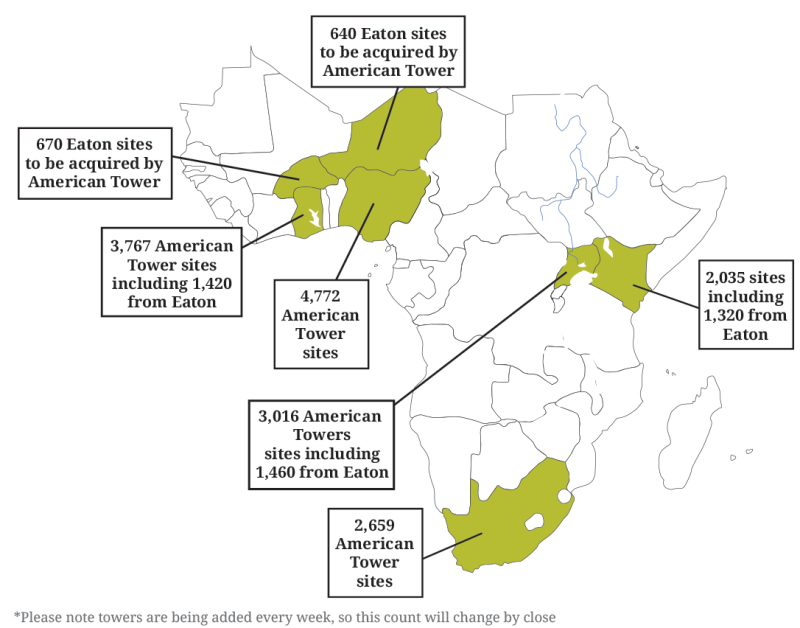
Towerco-on-towerco M&A deals >$100mn in the last six years
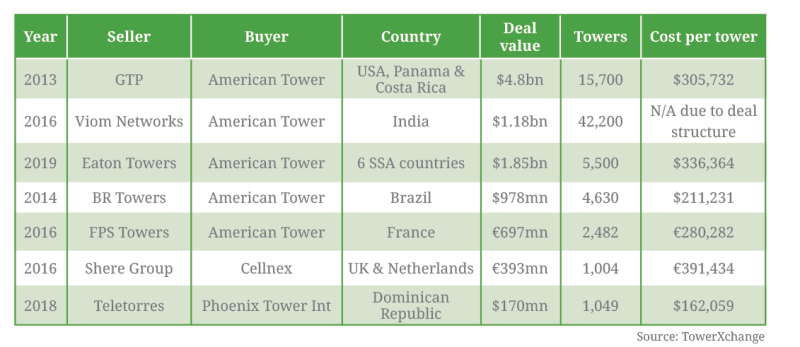
Towerco-on-towerco M&A for undisclosed sums, which TowerXchange suspect exceeded US$100mn, in the last six years

As shown in the accompanying table. American Tower’s acquisition of Eaton Towers is the third largest towerco-on-towerco deal in the last six years. American Tower has been the buyer in the top five such deals, which shows the willingness and capacity American Tower has to acquire successfully managed independent tower portfolios around the world.
Spencer Kurn, from New Street Research adds, “This is a solid deal for AMT: it will drive higher organic growth for the overall company, increase scale in three of their existing African markets, and of course be financially accretive. Further, we think it may pave the way for additional tower deals in Africa, potentially with Helios and IHS.”
Kurn continues, “Tower M&A tends to be positive for AMT (and other tower companies) because it drives a virtuous cycle of compounding returns. The transactions tend to be accretive to both organic growth and AFFO per share at the outset, thereby giving tower companies more scale and capacity for additional deals, which also tend to be accretive and provide more capacity for more deals, and so on.”
What has American Tower bought?
The deal posits the acquisition of approximately 5,500 towers, but continuing organic growth has already uplifted that tower count to 5,510. Eaton Towers owns 1,420 sites in Ghana, 1,460 in Uganda, 1,320 in Kenya, 640 in Niger and 670 in Burkina Faso. American Tower will enter Niger and Burkina Faso for the first time, but the deal will lead to consolidation in Ghana, Kenya and Uganda where both American Tower and Eaton are already active.
Eaton Towers acquired the majority of their sites in sale and leaseback deals from 2010 to 2014, including a substantial 2014 deal with Airtel for 2,681 sites in Ghana, Burkina Faso, Kenya and Uganda. This deal was the only Eaton deal TowerXchange has an estimated valuation of, valuing it at US$540mn and giving a per tower valuation of US$201k. Having ingested towers with a tenancy ratio close to one, Eaton Towers has both leased-up and upgraded the sites, such that American Tower now values Eaton’s assets at US$336k per tower, attracting a ~66% premium on the price paid in 2014. Importantly, Eaton hasn’t only added Tower Cash Flow, they have also significantly de-risked new markets for American Tower – proving that the regulatory regime and culture of infrastructure sharing would enable towercos to flourish.
Analysis of revenues
Eaton Towers pre-merger portfolio characteristics

52% of Eaton Towers’ property revenue comes from Airtel Africa. Comparably Africa’s other big three MNOs Orange, MTN and Vodafone only contribute 31% of revenues together. Add in “Other Tier One” operators – likely referring to Safricom in Kenya, AirtelTigo in Ghana and Maroc Telecom/Moov in Burkina Faso and Niger – and around 90% of Eaton Towers’ revenues come from Tier One MNOs.
Post-Merger American Tower EMEA characteristics
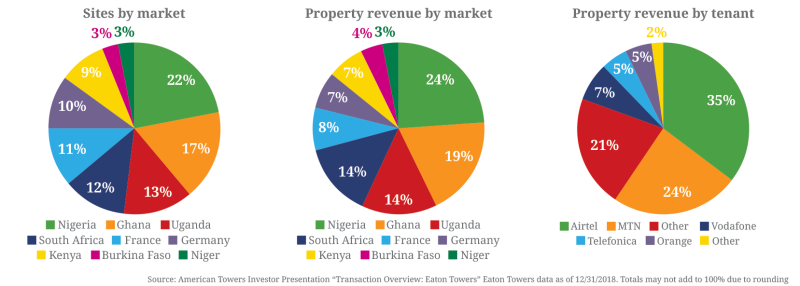
There is a degree of counterparty risk concentration in Eaton deriving 52% of revenues from Airtel, meaning ATC’s EMEA revenue, post-acquisition, would come 35% from Airtel, but the more important factor from a risk point of view is ATC diversifying their African exposure away from Nigeria. While Airtel’s performance in Africa is improving, some may feel that Airtel may have slightly less certain long-term commitment to Africa than say MTN or Orange, but they are still a credit-worthy, tier one tenant. A prospective Airtel Africa IPO wouldn’t adversely affect counterparty risk, and even if Airtel hived off African opcos country by country, new owners would likely deploy more capex – and if consolidated by an existing player, there is a precedent in terms of towercos negotiating swaps instead of exits from tenancies in Africa. Finally, that Airtel may in certain markets be lagging market leading MNOs in coverage, QoS or in 3G and 4G deployment, represents potential upside for ATC as Airtel invests to close the gap on market leaders.
Nick Del Deo from Moffett Nathanson explains, “One needs to be cognizant of customer concentration, especially if the customer has poor operating or financial attributes, or if it is likely to be acquired and drive churn (American Tower’s acquisition of Viom in India is a case in point). Airtel Africa doesn’t really fall into this category, and has recently raised equity to reduce debt and, per press reports, is considering an IPO to further improve its capital structure. American Tower already does business with Airtel Africa in three of the acquired markets (Ghana, Kenya, and Uganda) and is presumably comfortable with the outlook for this customer.”
Leases and opex
Average remaining tenancy durations on Eaton Towers’ sites is around six years. However, this figure is somewhat misleading as each new site contract resets the tenant’s clock to ten years.
There is little risk of churn in Eaton Tower’s markets. In both Niger and Burkina Faso, it is the sole independent towerco, and in all five markets Eaton has demonstrated an excellent service level – in some cases it is posting 100% uptime, as has been the case in Ghana recently. Likewise, in-market consolidation, which is a risk particularly in low ARPU African markets, can lead to swaps rather than tenants churning – towercos such as Eaton and Helios have generally been flexible, as long as their overall business grows.
Likewise, ground leases are a low risk across Eaton’s portfolio, generally running to just a couple of hundred dollars per calendar month per site. These ground leases have been continually renewed and are simply not the same order of magnitude of expense as in other countries.
Power, on the other hand, remains a major expense for Eaton Towers – 25% to 50% depending on market – but again, due to its contract structure and operational strategy, it is a manageable expense. Eaton provides power as a service in all its markets, but while Eaton shares the benefit of energy volume savings with its tenants, Eaton can still enhance their margins by investing in energy efficiency programmes, such as by deploying lithium-ion batteries.
Organic growth opportunities
The purchase of Eaton Towers was not just a purchase of an existing portfolio of towers, but also an investment in an anticipated pipeline of build-to-suit. Eaton Towers has right of first refusal with Airtel in all five of its markets and the American Tower acquisition, coupled with Airtel Africa’s return to profitability and projected post-IPO improvements in financial health, mean a healthy new build pipeline of approximately 3,000 towers is anticipated in the next decade.
The 400 new towers Eaton built in 2018 was a higher total than American Tower’s in EMEA and U.S. businesses combined over the same period.
Impact on the African tower market
This deal may herald a period of consolidation in the pan-African tower market, reducing the number of major towercos active from four to three, and suggesting both IHS Towers and Helios Towers could be future acquisition targets for American Tower.
The 14,111 towers of the combined American Tower/Eaton Towers portfolio puts it behind IHS Towers’ 23,276, in fact American Tower EMEA’s expanded seven country Africa portfolio will still be smaller than the 15,828 sites IHS Towers owns in Nigeria alone. But it is more than double Helios Towers’ 6,533 African sites, and no regional comparison can distract from the global financial firepower and success of American Tower PLC.
Valuations
Spencer Kurn of New Street Research LLP the Eaton deal could “pave the way for more (bigger) deals in Africa in short order. IHS Towers and Helios Towers, with ~20K and ~7K towers, respectively, may be looking to sell after unsuccessful IPO processes last year. If American Tower can strike deals with these companies at similar terms, it would be positive for the equity.” TowerXchange takes a deeper look at what such deals might look like.
Eaton’s tenancy ratio was reported at 1.5x, at USD$260mn property revenue across 5,510 towers, suggesting each tenant is paying an average of US$2,621 per month.
Helios Towers’ Q1 2019 results report a 2.03x tenancy ratio and US$374.8mn in revenue across their 6,433 sites (excluding South Africa), suggesting each tenant is paying an average of US$2,392 per month, 9% lower, although this primarily reflects the original sale and leaseback deal structures Helios Towers agreed in many markets, where the initial outlay was lower to facilitate lower lease rates.
IHS Towers’ financial results are not publicly available to the same degree as Helios Towers. However, subsidiary IHS Netherlands Holdco, which operates 27% of their portfolio, did issue a bond, and thus publishes limited information which we can use to perform a similar, if Nigeria-centric analysis. IHS Towers has 10,180 tenants on the 6,597 towers for which we have data for, for a tenancy ratio of 1.54x. These 10,180 tenants generated US$104.1mn in revenue in Q1 this year, for a total of US$852 per month, reflecting lower lease rates in Nigeria, where lease rates came under considerable pressure in recent years with the devaluation of the Naira.
While these revenue comparisons are interesting, it is EBITDA margins and multiples thereof which will give us the best guidance on what an acquisition of Helios Towers of IHS Towers would look like. Applying Eaton’s December 31 2018 EBIDTA of US$140mn and American Tower’s 13.2x multiple on that might give us the best indication of IHS Towers and Helios Towers’ potential valuations.
Eaton Tower’s EBITDA margin of 58% (US$150 EBIDTA versus US$260 revenue) is higher than the 52% reported by Helios Towers, but lower than the 67.5% reported by IHS Towers on their 6,597 bond-financed Nigerian towers.
Helios Towers is targeting a 55% EBITDA margin, but conservatively assuming no improvement, and multiplying its reported Q119 EBITDA by four, gives us US$195.2mn. A 13.2x multiple would therefore value Helios Towers at US$2.576bn or US$401k per tower. The available figures exclude the recently established Helios Towers South Africa and their 100 tower portfolio. The valuation puts Helios close to, but below, the US$2.8bn they reportedly sought at when exploring a potential IPO in 2018.
Using the last full year of revenue reported, US$1.168bn for IHS Towers, and on the assumption that the most recently reported EBITDA margin for its Nigerian towers are representative, TowerXchange estimates would annually generate EBITDA of US$788mn. A 13.2x multiple puts IHS on a valuation of US$10.4bn, similar to the US$10bn mooted when IHS explored an IPO, and an average tower value of US$447k. However, with the acquisition of some 9,800 sites in Kuwait and Saudi Arabia agreed but not yet closed, IHS Towers’ valuation may soon have to be upwardly revised.
What are my towers worth?
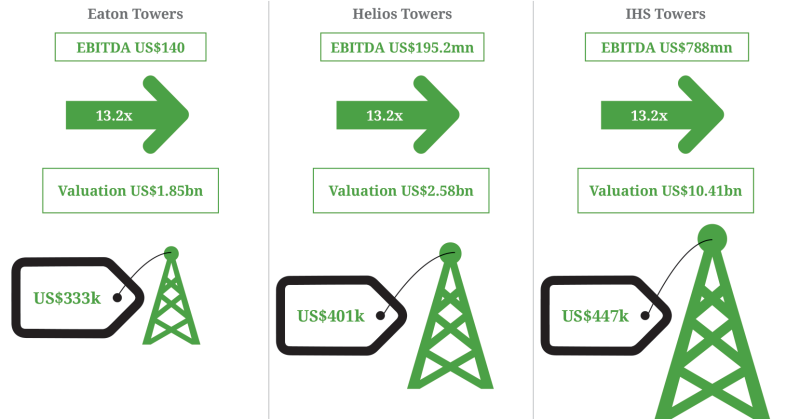
Kenya
Prior to this announcement, American Tower closed the acquisition of 715 towers from Telkom in December last year, and Kenya’s number two and three operators announced a merger in February of this year to form Airtel-Telkom.
Kenya faced the dubious prospect of hosting two major MNOs and two independent towercos, an uncomfortable position for everyone. Eaton Towers’ acquisition changes all that, and puts nearly a third of Kenya’s towers under one roof. Safaricom owns and operates almost all of Kenya’s other 7,591 towers, with a handful owned by small middle-market towercos and Telkom retaining somewhere between 40-80 towers based in secure compounds or used for transmission.
Macro towers predominate in Eaton’s portfolio, with only around 4% of sites on rooftops, and only a low double digit deployment of in-building solutions.
As of Q4 2018, Airtel-Telkom – pending regulatory approval – will have 32.4% of Kenya’s subscribers, behind Safaricom’s 63.3% (Source: Communications Authority of Kenya). While the market in Kenya is still uncomfortably concentrated, the cost-reductions available and reduced pressure on margins will help consolidate financial results in Kenya for all parties.
Hundreds of Eaton and American Tower sites are within 500m of one another, but what was previously a risk is now an opportunity. There has never been much prospect of decommissioning or cancelled leases because both Eaton and American Tower’s contracts had secure lock-in clauses. However, exercising lock-in clauses can be damaging to towerco/operator relationships, so they are rarely used and negotiated exits and quid-pro-quos are the norm. What could have been an awkward discussion has now become an opportunity for share cost-reductions by decommissioning sites and increasing co-locations. Even if network densification renders that option little used, it will still smooth relationships.
Decommissioning prompted by the Airtel-Telkom merger can now be managed, but Kenyan build-to-suit will suffer somewhat relative to pre-Airtel-Telkom merger forecasts. Following the announcement of the merger, Telkom cancelled its planned new towers for 2019, except for emergency builds to fix outages. However, Airtel will continue with its pre-merger planned expansion of around 250 new sites, and with the Eaton acquisition, American Tower will be fulfilling these, partially compensating for the delay in new Telkom sites.
Ownership of Kenya’s 7,591 sites
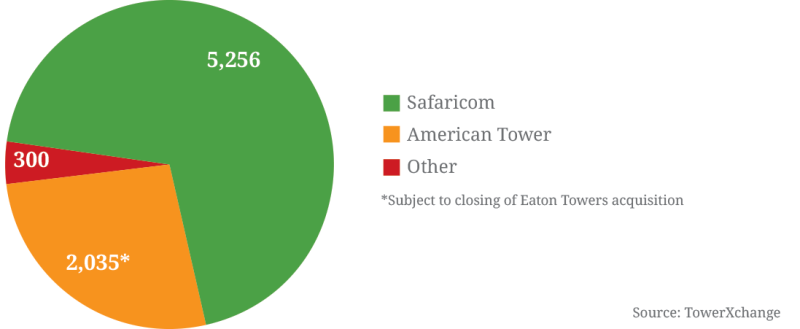
Uganda
Eaton Towers has completed three tower transactions in Uganda, acquiring the towers of Orange, Warid and Airtel. Airtel has since acquired Warid whilst Orange has sold out to Africell. After a programme of build-to-suit, TowerXchange understands Eaton Towers has a portfolio of 1,460 towers in the country. American Towers owns 1,590 towers in the country after acquiring 962 from MTN in 2011, and adding substantially since then. The consolidated American Tower would own 79% of Uganda’s towers.
There are five MNOs in the Ugandan market; MTN, Airtel, Africell, Smile and UTL, and there is the prospect of the entry of a sixth. Lycamobile, the international calling specialists and previously MVNO-only operator, is partnering with local ISP Tangerine to launch a MNO into Uganda and is in talks with local towercos about their tower requirements. This means there is a healthy upside to tenancy growth in Uganda.
Around 27% of Ugandan sites are off-grid, with about half of new build being off-grid. Grid outages are common, even in Kampala, meaning that lots of investment is going into hybrid solutions. Eaton currently have a pilot study underway to assess hybrid solutions under both capex and opex models. Similarly, theft of fuel and batteries has been a major issue in Uganda, which has pushed up opex, although initiatives to improve law and order and community relations in the country has significantly reduced this cost from its peak.
Ownership of Uganda’s 3,816 towers
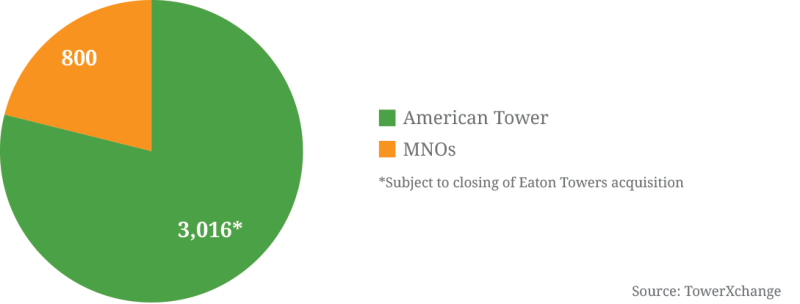
What the deal means for Ghana
Ghana has a crowded telecoms landscape with four mobile operators, three LTE-only operators, two middle-market towercos and now two international independent towercos. MTN leads the MNO market, followed by AirtelTigo and third placed Vodafone. MTN dominates 4G subscriptions with 93% of the market, but Blu, Surfline and Broadband Home share the remaining seven percent. Glo Mobile has nearly 2% of voice subscriptions and 1% of LTE-subscriptions.
In 2010, Helios Towers set up a joint venture with Tigo as minority partners into which 831 towers were transferred. Shortly afterward Eaton Towers closed their manage with license to lease deal with Vodafone Ghana, then American Tower set up another joint venture with MTN. Airtel’s towers were later sold to Eaton in 2015. Two middle-market towercos are active in the market, and may become acquisition targets on American Tower’s path to consolidation: Pan African Towers has 300 sites in the country and African Towers has also built a portfolio of 150 macro sites as well DAS and IBS-solutions at around 50 different sites including major airports.
Eaton Towers has recently achieved a run of 100% uptime for its Ghanaian sites, which is impressive even in a country with relatively good grid. Grid coverage and availability is good by African standards, but electricity prices have recently skyrocketed meaning that the business case for solar and hybrid is strengthened and the use of deep cycle batteries is growing. Around 200 towers were added in 2018, and more build-to-suit is expected. Helios Tower won the process to become AirtelTigo’s preferred towerco following their merger, but a consolidated American Tower may be in a strong position to secure BTS contracts from market leader MTN and third placed Vodafone, and they will inherit Eaton’s right of first refusal with Airetel.
Ownership of Ghana’s towers
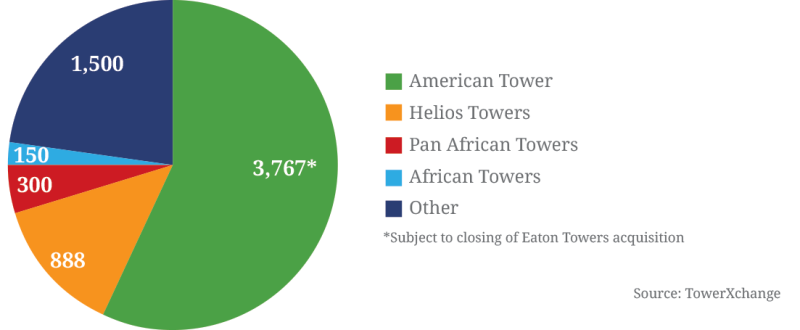
Niger
There are four MNOs in Niger; Airtel, Moov, Orange and Sahelcom. Airtel sold their portfolio of 600 sites to Eaton, with the transaction closing in 2017, and the towerco has since built 40 further sites, meaning Eaton own more than a third of the sahel-state’s 1,800 sites. Over 50% of the country’s towers are off-grid with Eaton examining renewable energy options (including the repair or replacement of 200 solar sites the company has inherited).
The tower market is complicated by the recent signing of an ESCO-deal by Orange with Camusat’s Aktivco covering around 500 sites. This limits the options for inorganic growth in Niger, but with Airtel’s recent turnaround in profitability in the African market and their acquisition of a 4G license, Eaton had good cause to expect build-to-suit activity to pick up.
Burkina Faso
As in Niger, the opportunities for inorganic growth in Burkina Faso are limited by the signing of a ten-year ESCO agreement by Orange with Camusat’s Aktivco on their 300 non-Eaton sites. Eaton has added approximately 30 sites since acquiring its portfolio from Airtel in 2014, but with 4G licences being issued, build-to-suit should pick up. Eaton Towers has recently finished renewing the energy equipment on its portfolio, as with only three MNOs the glass ceiling on tenancy ratios is lower, so operational efficiency is essential to improving margins.
There are 2,380 towers in Burkina Faso, Airtel sold ~700 towers to Eaton Towers in 2014, on which Orange is now the anchor tenant on following its acquisition of Airtel’s opco. There are three MNOs in Burkina Faso; with Onatel (part of the Maroc Telecom group) and Orange each having just over 40% market share each and third placed, Telecel having 16% (Source ARCEP August 2017). 4G trials were begun by Onatel and Orange following the introduction of a new licencing regime last year. However, mobile broadband penetration still sits at only 27%, and the overall mobile penetration rate only recently hit 100%.
What’s next
American Tower’s acquisition of Eaton will be subject to regulatory approvals in each country. The deal is targeted to close in Q419.
Regulators preferences often include considerable reemployment of local staff. At the time of the transaction announcement, Eaton had 200 employees.

